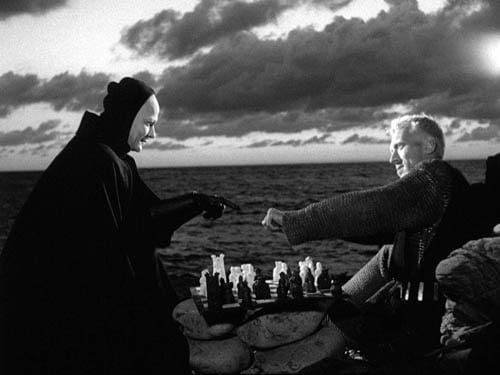
Horror films get to work on our psyche on a number of levels. There’s the thrill factor of not knowing what will come jumping out of the corner of the screen next – think of the manipulative slow tracking shots and interposed jump cuts favoured by John Carpenter and showcased to great effect in the original Halloween.
Then there’s a slower burn of nervous anticipation – where the viewer knows something bad is going to happen, but can’t quite determine the how, what and when of it. Scream (1996), crafted by Kevin Williamson and the late Wes Craven is a good example of how to extend this shiver of trepidation and make it last throughout the entire film: we, the audience, know of this threat level, yet the characters onscreen grasp the hazard of their position slowly, uncomprehendingly. Many of them can’t quite believe the menace they are facing – often until it’s too late to combat effectively.
There’s a further string to the horror movie bow however, and it’s provided by games.
Playing games is such a commonly-held human experience that to introduce a game into a movie plot instantly sets a scene, be it to show boredom in a spooky warehouse – two security guards playing draughts before being summarily dispatched by some creeping fiend – or to establish a sequence of rule-based moves, with some kind of sinister penalty attached for the losing party. Here the tension lies in working out who will lose, and what will happen to them by way of consequence.
It’s a common trope in horror; screenwriters often play games with the audience, and they frequently use the format of gaming in order to do so. Let’s take a look at how this plays out on screen.
Setting the Scene

“A beginning”, as Virginia Madsen intones solemnly at the start of Dune, “is a very delicate time”.
Know then that one of the best and most naturalistic ways to introduce your core characters, particularly in a base-under-siege movie, is to have them gathered together in one room playing some kind of card game.
For reasons that should shortly become clear, filmmakers generally prefer that card game to be poker, and by poker they usually mean this varation; by far the most widely-travelled variation on the game. From the bored science team stationed at the remote Antarctic research base that becomes the hunting ground for The Thing, to the jaded crew of the Nostromo charting the silent gulf between stars in Ridley Scott’s Alien, expendable humans on long haul jobs would appear to spend an awful lot of their downtime playing and occasionally falling out over hands of poker.
A game of “Snap” would presumably break the tension here, but poker is a go-to plot device for more reasons than that. As a game and as a cinematic sequence, it’s familiar and recognizable: people around a table – check. Cards in their hands – check. Some indistinct dialogue concerning the placing of a bet – check. It’s your typical poker scene, burned into the brain of the viewer in an establishing shot that might last perhaps a handful of minutes; job’s done, time to get the plot moving…
Now some filmmakers pull off this trick better than others, but you can’t blame anyone for trying -after all, the characters have to be seen to be doing something before they can be arbitrarily plucked from existence. To stage them playing a game together is by far a better option than for one of these strangers to turn stiffly to camera and disgorge chunks of lumpen exposition on the theme of who everyone is and what they’re up to.
The idea behind such scenes is to show for the audience a group of people indulging in an ordinary relatable pastime, which in turn normalizes the location, however isolated or alien it might be. It also serves as an opportunity to present the characters in a relaxed setting, where their individual personalities can come across naturally. It’s a pause for breath before the screaming begins, a narrative convention that seeks to establish interpersonal tensions, bonds of friendship, and rivalries, before the story develops an external threat for the group to face.
Running with Knives
Unless all those ducks are set carefully in a neat and tidy row at the outset, then any later plot developments run the risk of passing by without interest: stripped of familiar elements, the viewer has nothing and no-one onscreen to emotionally attach to.
Next time you sit through an entirely forgettable splatter flick concerning a small party of bland stereotypes who go camping/hosteling/hiking/travelling solely in order to throw themselves onto pointy objects in the dark, when all the action slides by in one gloopy mess of mediocrity, ponder on what makes this offering so unseasonably dull. It probably has something to do with how the screenplay barely bothered to introduce any of the characters before shuffling them off into oblivion.
A friendly game of cards might have helped, or if there’s no pack to be had, then maybe the knife game from Dark Star; at any rate something light and recreational at the outset, to gently ease the viewer into the bloodbath to follow.
Dicing with Death

AMC’s long-running series The Walking Dead took the idea of teasing the viewer to unbearable levels a while back, with an audacious cliff hanger of the ‘which of your favourite characters is going to get their heads knocked off?” variety that attempted to spread the suspense over an entire season break purely with the aid of a wet thumping sound and some judicious editing – whether this approach succeeds is debatable, but once again, you can hardly blame the studio for trying.
Fundamentally, whether the game in question should be called “Consequences”, “the Counting Game” “Russian Roulette” or “This Little Piggy” is entirely up to you; whatever name fits it best, it’ll come down to rolling a dice, flipping a coin, picking a card, drawing a short straw: toying in some way with the fickleness of fate.
This branch of games, with its deliberately randomized element, gets a lot of outings in horror, where it serves a number of singularly useful functions. In one guise or another, it’s to be seen in everything from The Cube to Saw, and beyond, far into the gore-flecked realms of ambitious film-makers who saw Eli Roth’s Hostel and thought “I can do that”. (But probably shouldn’t).
Let’s say for the sake of argument that the movie in question has built a solid core of characters we can invest in, and a plot sufficiently coherent that we can follow it and appreciate the thrills set aside for us along the way, what better twist than to introduce an element of randomized death into the proceedings? However resourceful our heroes and heroines have proven so far, let’s see how they can survive being the unlucky number in a counting game conducted by a lunatic in a cellar.
There’s an incongruity attached to the idea of turning an innocent parlour game into something much more sinister that serves to link us to the characters we are watching onscreen, that we might empathize with their plight all the more.
Of course, we as an audience are being manipulated, played like so many violin strings, but the point of a good horror film is that we no longer care – we’re in it for the ride as much as we are the destination.


Be the first to comment